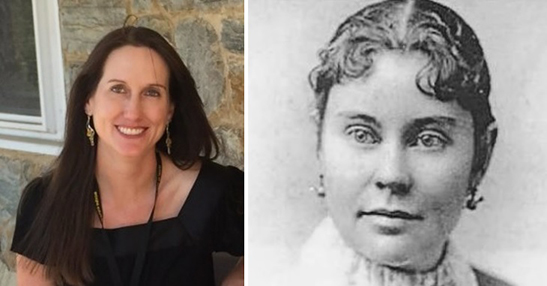Alfred University English Professor Juliana Gray turns her sights on Lizzie Borden in West Branch magazine essay

Alfred University Professor of English Juliana Gray’s interest in true crime literature began when she was in her teens.
Gray grew up reciting the rhyme about Lizzie Borden, the Fall River, MA, woman charged with murdering her father and stepmother with an axe in 1892.
Lizzie Borden took an axe
And gave her mother forty whacks,
When she saw what she had done,
She gave her father forty-one.
And the story of Lizzie Borden stayed with her, in part because of the compelling rhyme of the poem. But Borden’s alleged guilt also became problematic as Gray read more about the murders. “I just assumed she was guilty, but in my 30’s I realized she had been acquitted. Now that I’ve read more about the case, I’m inclined to think she was innocent of the charge.”
The prestigious literary magazine West Branch has now published an essay by Gray on Borden, “Lizzie Borden and the Forty Whacks: Notes on a Rhyme,” in which Gray pokes and prods at the ambiguous circumstances surrounding the murder of Borden’s father, Andrew Borden, and stepmother, Emma Borden.
As a writer of her own precisely metered lines, Gray notes the linguistic power of the Lizzie Borden poem’s short lines: the rhyming of “whacks” and “axe,” which Gray characterizes as “the voiceless velar fricative of /k/ combined with the voiceless alveolar fricative of /s/.” The linguistic qualities of the poem create, she observes, “a violent, chopping sound.”
The essay also explores the mysteries surrounding the case – Borden was acquitted of the murders in court, and to this day there has not been a definitive conclusion to the investigation – emphasizing its inept forensics and prosecution. The case endures as a mystery, Gray says. “It’s fascinating because it will never be solved. It’s like Jack the Ripper. Both cases will remain mysteries unless someone someday finds a diary in an attic.”
The West Branch essay follows Borden through the periods before and after the murders, and though her eventual trial in which the jury and prosecution were flummoxed by the possibility of a genteel, upper-class woman murdering her father and his wife with an axe. Borden, Gray recounts, continued to live with the alleged guilt for the rest of her life, after she and her sister moved to a large home in Fall River, where she was ostracized by the community and taunted by children reciting the now-famous rhyming lines.
“In that sense,” Gray says, “she was a victim of a crime for the rest of her life, even though she probably didn’t do it.”
Gray’s essay on Lizzie Borden joins other essays she has written based on her interest in true crime and serial murders. Her poetry has been published in numerous literary magazines, as well as in collections; she has published narrative essays, and additional work in journals such as McSweeney’s.
And she teaches creative writing in Alfred University’s Division of English. “I’m not interested in hit men or mob hits,” she says. “Those are business transactions. There has to be a good story, and if there’s no personal motivation, there’s no story.”
For more on Gray, visit her website: https://www.julianagray.net/
